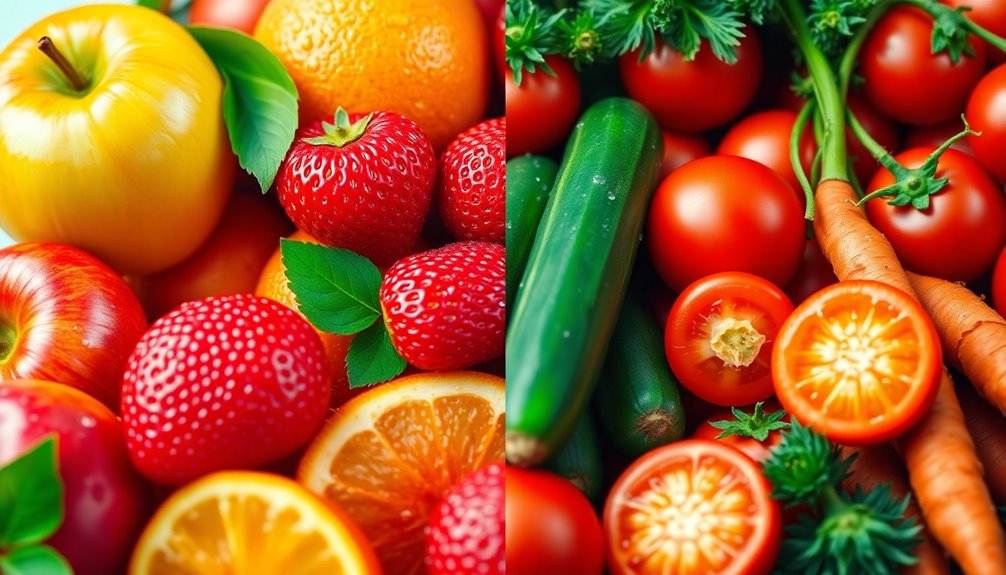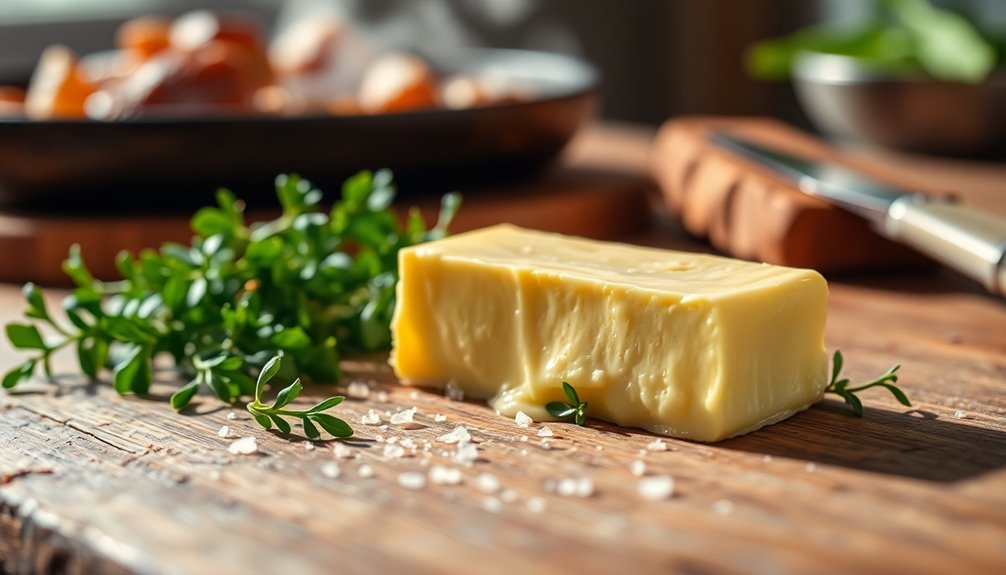Did you know that butter extract can be used for multiple purposes in different cooking methods?
With its rich and creamy flavor, butter extract adds depth and complexity to desserts, pastries, and even beverages.
As a food scientist, I have extensively studied the extraction process and composition of butter extract, and I’m excited to share with you its potential benefits and drawbacks in various recipes.
Get ready to discover the wonders of butter extract in your cooking and baking endeavors!
Key Takeaways
- Butter extract is derived from natural sources through an extraction process and adds a rich and buttery flavor to dishes.
- It enhances the flavor profile of sauces, desserts, pastries, and savory dishes.
- Butter extract can be used in moderation to intensify the buttery taste without adding moisture.
- It is a valuable ingredient for creating dairy-free alternatives and infusing unique flavors into beverages and cocktails.
Baking and Cooking Applications
I use butter extract in my baking and cooking to add a rich and buttery flavor to my dishes. As a food scientist, I understand the purpose and function of butter extract in culinary preparations.
Butter extract is derived from natural sources and is obtained through an extraction process that captures the essence of butter flavor. Its composition includes compounds that mimic the taste and aroma of real butter.
When added to recipes, butter extract enhances the flavor profile, making it ideal for flavoring sauces and adding richness to various dishes. However, it’s important to note that butter extract should be used in moderation, as excessive amounts can overpower other flavors.
Flavoring Desserts and Pastries
When baking, I always reach for the butter extract to add a rich and buttery flavor to my desserts and pastries. Butter extract is a concentrated flavoring derived from butter, which allows for a more intense and long-lasting butter taste without the added moisture that actual butter would provide. It’s commonly used in various culinary applications to enhance the flavor profile of dishes.
Some potential uses of butter extract include:
- Flavoring ice cream: Butter extract can be added to ice cream bases to create a creamy and indulgent butter-flavored treat.
- Adding richness to sauces: A few drops of butter extract can be incorporated into sauces to elevate their flavor and provide a smooth, velvety texture.
- Enhancing baked goods: Butter extract can be used in cakes, cookies, and pastries to infuse them with a pronounced buttery taste.
- Creating butter-flavored toppings: From frostings to glazes, butter extract can be used to make delicious butter-flavored toppings for desserts.
Enhancing Butter-Based Recipes
To enhance butter-based recipes, I often incorporate other flavorings such as vanilla or almond extract for added depth and complexity. However, another option that can be used is butter extract.
Butter extract is a concentrated flavoring that captures the essence of butter in a convenient liquid form. It’s typically made by extracting the natural compounds found in butter through a solvent-based process. This extract is then used to flavor a variety of culinary preparations, including both sweet and savory dishes.
In savory dishes, butter extract can be used to add a rich and buttery flavor to sauces, dressings, and even roasted vegetables. Additionally, butter extract can also be used in homemade skincare products, such as lip balms or body butters, to provide a luxurious and indulgent scent.
However, it’s important to note that butter extract should be used sparingly, as it’s highly concentrated and can overpower other flavors if used in excess.
Creating Dairy-Free Alternatives
Another option for enhancing butter-based recipes is to incorporate dairy-free alternatives, such as plant-based margarine or coconut oil, which can provide a similar richness and flavor. However, for those who desire a more authentic butter taste without the use of actual butter, butter extract is a valuable ingredient.
- Butter extract is a concentrated flavoring agent derived from real butter.
- It’s made by extracting the essential oils and compounds from butter through a distillation process.
- The composition of butter extract includes fatty acids, esters, and volatile compounds that contribute to its distinct flavor profile.
- Butter extract can be used in a variety of culinary preparations, including baking, frosting, and even savory dishes.
While butter extract offers convenience and flavor, it’s important to note that it may not provide the same health benefits as using actual butter. It’s wise to consider the potential drawbacks of using butter extract, such as the presence of artificial additives or the loss of certain nutrients found in real butter.
Transition: Now that we understand the potential benefits and drawbacks of using butter extract, let’s explore how it can be used to infuse beverages and cocktails.
Infusing Beverages and Cocktails
As a fan of unique flavor profiles, I enjoy experimenting with infusing beverages and cocktails with the rich and distinct taste of butter extract.
Butter extract is a concentrated form of the flavor compounds found in butter, made through a process of extraction from butterfat. Its composition consists of various volatile compounds, such as diacetyl and acetoin, which contribute to its buttery aroma and taste.
When used in mixology techniques, butter extract can add a delightful twist to classic cocktails. The flavor pairing possibilities are endless, from incorporating it into creamy liqueurs to creating butter-infused simple syrups for a unique flavor profile.
However, it’s essential to use butter extract in moderation as its strong flavor can easily overpower other ingredients. Experimentation and careful balance are key to achieving the perfect blend of flavors in your beverages and cocktails.
Frequently Asked Questions
Are There Any Health Benefits to Using Butter Extract?
Using butter extract in cooking or baking can enhance the flavor of dishes without adding additional fat or calories. However, it’s important to note that there are no significant health benefits associated with using butter extract.
Can Butter Extract Be Used as a Substitute for Real Butter in Recipes?
Butter extract can be used as a substitute for real butter in recipes. It provides a concentrated butter flavor without the added fat. However, it is important to note that butter extract is not the same as margarine. To make homemade butter extract, one can steep butter in a liquid such as milk or oil, then strain out the solids.
Does Butter Extract Have a Strong Flavor, or Is It Subtle?
Butter extract can have a strong or subtle flavor, depending on the brand and concentration. It is commonly used in baking to enhance buttery flavor, but can also be used in savory dishes for a hint of buttery taste.
Can Butter Extract Be Used in Savory Dishes, or Is It Mainly for Sweet Recipes?
Butter extract can be used in both sweet and savory dishes. In baking, it adds a rich buttery flavor to cookies and cakes. In sauces and dressings, it enhances the taste without adding extra fat.
How Long Does Butter Extract Typically Last Before It Goes Bad?
Butter extract typically lasts for about 1-2 years before it goes bad. To ensure its longevity, store it in a cool, dry place away from sunlight and heat. Following these storage recommendations will help maintain its quality and flavor.
Conclusion
In conclusion, butter extract is a versatile ingredient that adds a rich and creamy flavor to various culinary creations. It’s commonly used in baking and cooking applications, where it enhances the taste of desserts, pastries, and butter-based recipes. Additionally, it can be used to create dairy-free alternatives and infuse beverages and cocktails with a buttery taste.
With its extensive knowledge and expertise, a food scientist or culinary expert can provide valuable insights into the potential benefits and drawbacks of using butter extract in different culinary preparations.
So, why not give your dishes a touch of buttery goodness with this amazing extract?










